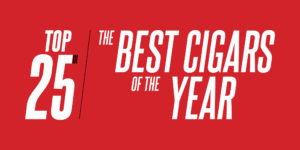Interview by Michael Beltrán and Nicolás A. Jiménez
After Cuban boxer Robeisy “El Tren” Ramírez won two Olympic gold medals, a horrific experience with Cuba’s dictatorship led him to leave his country and start a pro career, going on to win, defend, and then lose the WBO featherweight belt to Rafael Espinoza in December. Robeisy spoke with us about his rollercoaster career and how Cuba’s dictatorship has antagonized him every step of the way.
Can you remember your first cigar?
I don’t recall the details, but I must have been 18 or 19. In Cuba, I’d usually smoke cigars with friends. These days, it’s usually when I’m with my manager, José Izquierdo. If we’re getting together, it’s probably at a cigar lounge in Miami or Cigar House San Juan, Puerto Rico, where José lives.
What got you into boxing in Cuba?
I loved it as a kid. My friends were into it. We would get out of school and play sports. Boxing was the last sport I got into. I started boxing when I was 8, but I had already done baseball, karate and other sports. I won my first national title in the sixth grade.
Were you thinking that when you got older maybe boxing might be a way out of Cuba?
Not at that time. At first it was just an adventure. I was doing well and I was just having fun. Around the time I was 14, I relocated to Havana to join the Cuban national team and realized things were getting serious. A lot changed; I remember trainers would sometimes catch me in girls’ rooms and they would threaten us with not being able to go on certain trips.
That’s when you start to get opportunities to travel internationally. In Cuba, that’s not a possibility for most kids that age.

At what age would you say you started to develop this social and political consciousness beyond the fun you were having in boxing? Was there a key moment that opened your eyes or led you to decide you’d had enough?
Of course. It was about 2017 when they removed my tattoo.
Many years ago in Cuba, they’d put a law in place that barred boxers from having tattoos. Being a rebel, I already had two small tattoos. But after the gold medal wins at the 2012 games in London and the 2016 games in Rio, I had the Olympic rings tattooed on my left bicep. At first, they looked the other way. But when they decided they had had enough of my rebelling against them, they looked for ways to make my life difficult. So they gave me an ultimatum: remove your tattoo or never box again.
At first, I thought “I’m not boxing anymore.” But after speaking with a friend, I decided it would be best to go along with it, then put my head down and look for my chance to leave Cuba.
They took me to a clinic and removed the tattoo surgically. Not with a laser. I still have the scar but it’s not as visible because I’ve since covered it with another tattoo. To make matters worse, they didn’t even remove the whole tattoo. The way they did it, there wouldn’t have been enough skin to close the wound, so they left half of the bottom two rings and the years I had tattooed under them [2012 – 2016]. It’s like they left it that way to show not just me, but other people that if you don’t fall in line, you’re screwed.
At that time, it affected me mentally. But lots of people have scars. This is just one more. And now, you know what? I’m glad. I was one of the ones who rebelled against them enough to push them to something so ridiculous. I challenged them.
And now you’re fighting for world championships. You’re in a much better place, but they haven’t let up.
You won the WBO Featherweight title in April 2023 against Isaac Dogboe, then defended it [successfully]against Satoshi Shimizu that July. The night of that title defense in Japan, there was some controversy because the Cuban government had managed to get you banned from walking out to the Cuban national anthem and from using any national symbols like the Cuban flag (although you did already have the flag on your gloves and those got through). How did all that happen?
The information was communicated to my agent José about 30 minutes before the weigh-ins. It would have been strange for the promotion to relay that information directly to the boxer when he’s a guest in Japan as a host nation of the event.
I said, “This is going to be crazy when Cubans find out what’s happening here in Japan, so far from that country.” It bothered me, but part of me was happy because they showed me that even though they want to pretend that they don’t care, the truth is they’re watching the success that Cubans find outside the confines of their dictatorship. I realized that everything we have published, all the criticisms I have made in social media, all of that was affecting them.
Even Japanese fans reacted when they heard about this, showing up to the fight with Cuban flags. There was one Japanese fan who somehow managed to get through to the dressing room with a Cuban flag; he was playing the Cuban national anthem on his phone. He said, “If you can’t play it out there, we’ll sing it here.” We all sang the anthem.

Boxing is already a difficult sport. Adding the additional pressure of being told you can’t be who you are, how difficult was it to juggle both things at that moment?
Before that night, I had never had things outside the ring affect me so much in a fight. What happens outside stays outside. But in that moment, I thought, “I’m going to do my work, and after the fight I’m sending a message.” After I won, I recited the words into the microphone in the ring.
Lots of people know the topic well and talk about how that government functions. But I lived it. I suffered from how that dictatorship works. If you don’t do as they say, you’re against them. The fact that my way of being bothers them so much is what motivates me to take my message beyond the boxing world, to anyone who wants to know what’s happening in Cuba. They can see it through me, an athlete who has nothing to do with politics but who knows how these people operate. When I tell these stories, it’s not to find fans or get likes.
There are people who say, “You talk about the government but you’re just an athlete.” Yeah, but that dictatorship’s methods and priorities are passed along from the people in government to the trainers, who are sheep who follow what the state tells them, and they want to impose all of that on you. That’s where the problem comes for athletes like me. Politics permeates sports in Cuba. They turn everything into a political matter.
After Robeisy’s two Olympic gold medal wins, he tattooed the Olympic rings and those years on his left bicep. The Cuban government had the tattoo removed not with lasers, but with a scalpel.
So what’s next?
All I want now is a rematch to win my title back and get back to being the champion. Everywhere I go, fans tell me, “We need the rematch.” My whole life has been about bouncing back from adversity.
You must celebrate wins with cigars too. Has there been a particularly memorable smoke after a fight?
Man, in 2021 when we won a fight on the José Ramírez v. Josh Taylor card in Las Vegas, José and I went to the MGM to celebrate with cigars. We were there smoking and talking until 6 in the morning. We even ran into Taylor, who had become the undisputed light welterweight champion that night, and he joined us. That was a memorable one.
Do you have any favorite cigars you go back to again and again?
I tend to smoke cigars that are on the lighter side. Most often, it’s something from Arturo Fuente or Davidoff.




